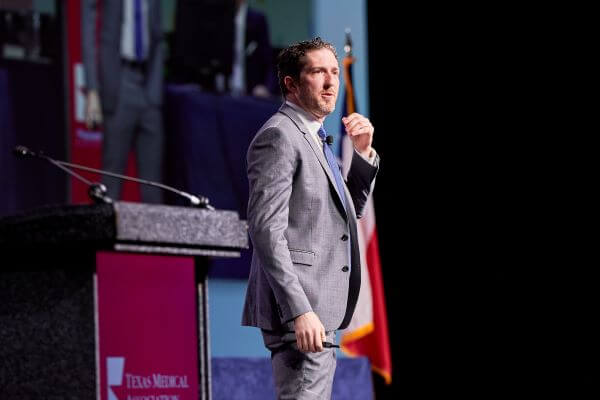
The experience of a cardiac arrest and surviving testicular cancer – twice – might seem even less funny than incisive critique of the U.S. health care system. But in the hands of Will Flanary, MD, an ophthalmologist in Oregon City, Ore., who moonlights as Dr. Glaucomflecken on social media, these topics occasion cathartic laughter.
His millions of followers on platforms like TikTok and Instagram already know this. Surely, he gained a few more after his speech during the closing session of TexMed, the Texas Medical Association’s annual conference, on May 4 in Dallas.
Before taking the stage, Dr. Flanary was mobbed by selfie-seeking attendees and received applause for his medical-themed comedy videos, which TMA House Speaker Brad Holland, MD, said “really stick it to UnitedHealthcare like nobody else can.”
During his speech, it became clear how Dr. Flanary deploys humor online to advocate for a health care system that is friendlier to physicians and patients alike. He also encouraged his fellow physicians to use social media to similar ends, citing his own success, including pressuring Aetna to reverse its policy requiring prior authorization for cataract surgery.
“We need trusted voices getting the correct information out there,” he told TexMed attendees.
Dr. Flanary also commended TMA for its own advocacy wins, including Texas’ landmark 2003 medical liability reforms and its 2021 gold-card law, which has inspired similar legislation in other states and at the federal level.
“You guys have done an amazing job with advocacy,” he said. “You’ve set the standard in a lot of ways.”
Dr. Flanary grew up in Houston, where he attended open-mic nights at the now defunct Laff Stop comedy club as a high school student. After graduating from Texas Tech University, where he met his wife, he matriculated at the Geisel School of Medicine at Dartmouth.
During his third year of medical school, he was diagnosed with testicular cancer and underwent treatment. Although he ultimately recovered, he found the experience isolating and leaned on comedy to cope.
“That’s why so many of us have a wonderful sense of humor in medicine – because we have to,” he said. “It helps us process.”
Four years later, during his residency at the University of Iowa, he was diagnosed with testicular cancer a second time, prompting big questions about his upcoming job search and growing his young family.
Comedy once again was a salve. He started his Dr. Glaucomflecken account on the platform now known as X, then Twitter, expanding his repertoire from “painfully specific ophthalmology jokes” to medicine more generally, while growing his audience.
After recovering from cancer a second time, he and his family relocated to Oregon, where he started his independent practice. With the onset of the COVID-19 pandemic, he ramped up his social media output. But in May 2020 he experienced another medical crisis: an unexplained cardiac arrest, from which his wife saved him by performing 10 consecutive minutes of chest compressions until paramedics arrived.
The experience broadened his empathy for patients and “co-survivors,” the loved ones and caregivers with whom they navigate follow-up care, multiple specialists, claim denials, and surprise medical bills. It also changed his approach to comedy.
“This is when I first started making videos about the American health care system,” he said.
Freshly galvanized, he made a video about prior authorizations, which prompted an immediate response from viewers, many of whom had been affected by the resulting care delays but had misplaced blame on their physicians.
“It taught me about the value of social media when it comes to advocacy,” he said, adding that the public is eager for a forum in which to discuss payers’ problematic policies and other barriers to care.
He also stressed the importance of physician participation on such forums, whether by making TikTok videos, like he does, or commenting in private Facebook groups. Otherwise, he warned, their expertise might not reach the public.
“Your voice has weight, as physicians,” he said. “Your voice has power.”
Get ready for more engaging speakers at the next of TMA’s valuable in-person meetings, including the Business of Medicine Conference scheduled for October. Read Texas Medicine Today for upcoming details and announcements.